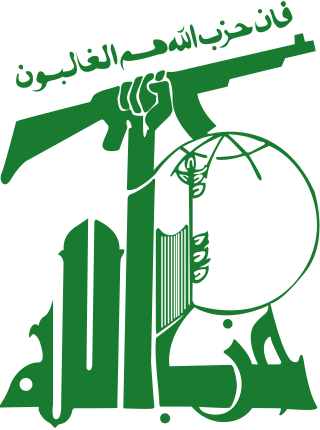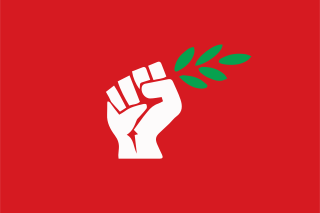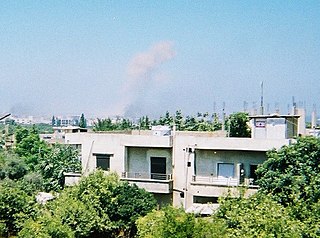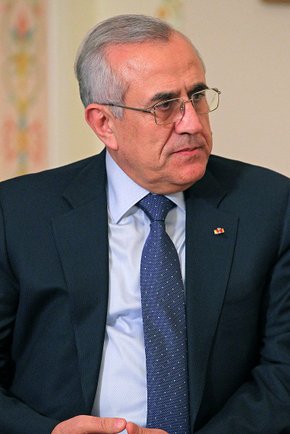| |||||
| Decades: | |||||
|---|---|---|---|---|---|
| See also: | |||||
The following lists events that happened in 2008 in Lebanon .
| |||||
| Decades: | |||||
|---|---|---|---|---|---|
| See also: | |||||
The following lists events that happened in 2008 in Lebanon .

Hezbollah is a Lebanese Shia Islamist political party and paramilitary group. Hezbollah's paramilitary wing is the Jihad Council, and its political wing is the Loyalty to the Resistance Bloc party in the Lebanese Parliament. Its armed strength was assessed to be equivalent to that of a medium-sized army in 2016.

Michel Naim Aoun is a Lebanese politician and former general who served as the 13th President of Lebanon from 31 October 2016 to 30 October 2022.

The Amal Movement is a Lebanese political party and former militia affiliated mainly with the Shia community of Lebanon. It was founded by Musa al-Sadr and Hussein el-Husseini in 1974 as the "Movement of the Deprived." The party has been led by Nabih Berri since 1980. The Greek Catholic Archbishop of Beirut, Grégoire Haddad, as well as Mostafa Chamran, were among the founders of the movement.

Fouad Siniora is a Lebanese politician, a former Prime Minister of Lebanon, a position he held from 19 July 2005 to 25 May 2008. He stepped down on 9 November 2009 in favor of Saad Hariri, the late Rafik Hariri's son. He is the leader of the parliamentary group of the Future Movement.
The ceasefire attempts during the 2006 Israel-Lebanon conflict started immediately, with Lebanon calling for an immediate and unconditional ceasefire already the day after the start of the war. Israel, however, strongly backed by the United States and the United Kingdom, insisted that there could be no ceasefire until Hezbollah's militia had been disarmed or removed from southern Lebanon. The United Nations Security Council held meetings throughout the conflict but failed to agree on a ceasefire resolution.

Lebanon's position in the 2006 Israel–Lebanon conflict from the start was to disavow the Hezbollah shelling and raid on 12 July, while calling for an immediate ceasefire and the withdrawal of all Israeli forces from Lebanese territory.
Hezbollah originated within the Shiite block of Lebanese society. According to the CIA World Factbook estimate in 2022, Shiites comprise 31.2 percent of Lebanon's population, predominating in three areas of Lebanon: Southern Lebanon, Beirut and its environs (Dahieh), and the northern Beqaa valley region.
Muhammad Fneish is a Shia Lebanese politician and member of Hezbollah. He represented Hezbollah in the Third Cabinet of Saad Hariri, serving as the Minister of Sports and Youth.

The 2006 Lebanon War, also called the 2006 Israel–Hezbollah War and known in Lebanon as the July War and in Israel as the Second Lebanon War, was a 34-day armed conflict in Lebanon, northern Israel and the Golan Heights. The principal parties were Hezbollah paramilitary forces and the Israel Defense Forces (IDF). The conflict started on 12 July 2006, and continued until a United Nations-brokered ceasefire went into effect in the morning on 14 August 2006, though it formally ended on 8 September 2006 when Israel lifted its naval blockade of Lebanon.
Along with the Amal Movement, Hezbollah is one of the two main parties representing the Shia community, Lebanon's largest religious bloc. Amal has made a commitment to carrying out its activities through political means, but remains a partial fighting force aiding Hezbollah when the need arises.
Hezbollah has a military branch and is the sponsor of a number of lesser-known groups, some of which may be little more than fronts for Hezbollah itself. These groups include the Organization of the Oppressed, the Revolutionary Justice Organization, the Organization of Right Against Wrong, and Followers of the Prophet Muhammad.

The March 14 Alliance, named after the date of the Cedar Revolution, was a coalition of political parties and independents in Lebanon formed in 2005 that were united by their anti-Syrian stance and by their opposition to the March 8 Alliance. It was led by Saad Hariri, Walid Jumblatt and Samir Geagea, as well as other prominent figures.

The 2006–2008 Lebanese protests were a series of political protests and sit-ins in Lebanon that began on 1 December 2006, led by groups that opposed the US and Saudi-backed government of Prime Minister Fouad Siniora and ended on 21 May 2008 with the signing of the Doha Agreement. The opposition was made up of Hezbollah, Amal, and the Free Patriotic Movement (FPM); a number of smaller parties were also involved, including the Marada party, the Lebanese Communist Party and the Syrian Social Nationalist Party. A majority of the members of the government were part of the anti-Syrian March 14 Alliance, a coalition of political parties and independents in Lebanon. The two groups were also divided along religious lines, with most Sunnis and Druze supporting the government, and most Shi'a supporting the opposition. The Christian community was split between the two factions, with Michel Aoun, the leader of the FPM, claiming to have more than 70% support among the Christians, based on the results of the 2005 parliamentary election.
The Beirut Arab University shooting happened on January 25, 2007, in the Beirut Arab University in the Lebanese capital.

The 2007 Lebanon conflict began when fighting broke out between Fatah al-Islam, an Islamist militant organization, and the Lebanese Armed Forces (LAF) on May 20, 2007 in Nahr al-Bared, a UNRWA Palestinian refugee camp near Tripoli.

The 2008 Lebanon conflict was a brief intrastate military conflict in May 2008 in Lebanon between opposition militias and pro-government Sunnis. After the 18-month-long political crisis spiralled out of control, with the government's decision to dismantle Hezbollah's telecommunication system, Hezbollah seized control of majority Sunni neighorhoods in west Beirut. The conflict ended with the adoption of the Doha Accord in 2008.

Michel Suleiman is a Lebanese politician who served as President of Lebanon from 2008 to 2014. Before becoming president, he served as commander of the Lebanese Armed Forces from 1998 to 2008.
Israel–Lebanon relations have experienced ups and downs since their establishment in the 1940s.
The Doha Agreement was reached by rival Lebanese factions on 21 May 2008 in Doha, Qatar to end an 18-month-long political crisis.
The following lists events that happened in 2007 in Lebanon.